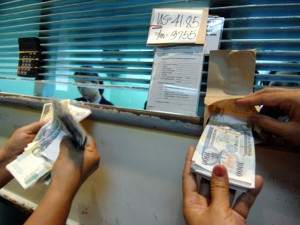Money sent home by Filipinos overseas amounted to $1.92 billion in November, up 7.6 percent from $1.78 billion in the same month last year, the Bangko Sentral ng Pilipinas reported Tuesday.
This brought remittances for the first 11 months of 2012 to $19.42 billion, up 6 percent from $18.32 billion in the same period in 2011.
“Remittances continued to draw strength from the increasing demand for skilled and professional Filipinos along with innovations in remittance service offered by banks and financial institutions,” the BSP said in a statement.
The move of some banks to tie up with remittance centers abroad and the initiative of others to put up their own money-transfer facilities in foreign cities that host overseas Filipino workers also encouraged the sending of more money to the Philippines.
Remittances to the Philippines came mostly from migrants based in the United States, Canada, Saudi Arabia, United Kingdom, Japan, United Arab Emirates and Singapore.
The BSP said there was a likelihood that remittances over the short to medium term would continue to grow given the continued deployment of a significant number of Filipinos to fill in job vacancies abroad.
Citing data from the Philippine Overseas Employment Administration (POEA), the BSP said there were 782,201 job orders for Filipino workers that were filed by foreign employers and approved by the POEA. The job orders came mostly from employers in Saudi Arabia, United Arab Emirates, Kuwait, Qatar, Taiwan and Hong Kong.
The central bank has estimated that total remittances for 2012 hit at least $21.1 billion, or 5 percent more than the previous year’s record. The World Bank estimated remittances to the Philippines to have reached $24 billion last year, saying the Philippines became the third-biggest remittance-receiving country in the world after India and China.
Meantime, inflow of dollars and other foreign exchange continued to surpass the outflow in 2012, with the country’s balance of payments (BOP) recording another surplus of $8.9 billion for the year.
This was based on preliminary data from the BSP, which said remittances and foreign investments in the country’s business process outsourcing industry largely fueled the BOP surplus last year.
The latest surplus, however, was lower by 13 percent compared with the $10.18 billion recorded in 2011.
The BOP is a record of the country’s commercial transactions with the rest of the world and shows the inflow and outflows of foreign exchange to and from the country.
The central bank earlier reported that at the end of 2012, the country’s gross international reserves (GIR) also settled an all-time high of $84.2 billion.
